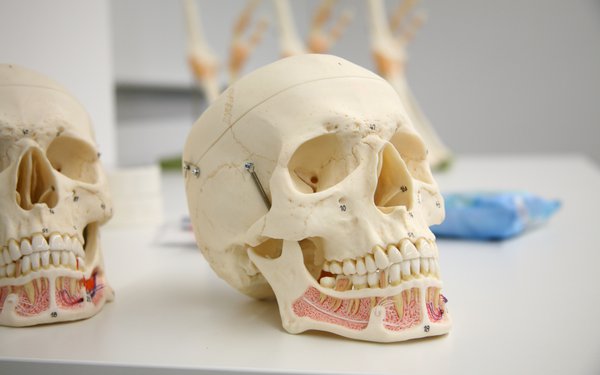Institute for Theoretical Medicine
Profile
The Institute for Theoretical Medicine is a focal point for systematic basic biomedical research at the University of Augsburg. Through close cooperation between the disciplines, small and large functional systems are to be researched equally with the aim of achieving a comprehensive understanding of the human organism and its diseases. Furthermore, the cooperation with clinical and clinical-theoretical medicine is of great importance. The aim is to transfer new findings from basic research to a clinical setting, and, on the other hand, to take up questions and findings from clinical medicine in basic research. The Institute comprises the Chair of Anatomy and Cell Biology, the Chair of Biochemistry and Molecular Biology, the Chair of Physiology and the Chair of Medical Psychology and Sociology.

Chairs
Chair of Anatomy and Cell Biology
One research focus of the chair is "Neurobiology of environmentally induced metabolic diseases": How does the brain control eating behaviour? And why do too many calories damage the brain in the long run? Pathological overweight and chronically elevated blood sugar levels can cause inflammatory processes in the brain and probably lead to the premature death of nerve cells. Artificial additives and harmful substances in food and their effect on the nervous system are also of great interest in this context.

Chair of Biochemistry and Molecular Biology
Research at the chair of Biochemistry and Molecular Biology focuses mainly on proteases. These are enzymes that can “cut up” other proteins. They are of crucial importance for the development and diagnosis of numerous diseases, for example diseases of the digestive system. A special group of proteases is active in the membrane of body cells and is involved, for example, in the development of Alzheimer's disease, infection with hepatitis viruses or malaria. The investigation of possible influences of these proteases on tumour development and metastasis as well as on sugar metabolism and thus on possible effects linked to diabetes is a great challenge.

Chair of Medical Psychology and Sociology
Research at the Chair of Medical Psychology and Sociology is conducted at the interface of medicine and psychology. One focus of research is the vicious circle of cognitive decline and pain in old age. Chronic pain has a negative impact on neuropsychological performance, such as attention, memory, speech or the ability to solve problems. At the same time, cognitive decline in older people is a risk factor for the development of chronic pain.

Chair of Physiology
Research at the chair of Physiology is primarily focused on questions of blood circulation. On the one hand, the focus is on the regulation mechanisms which ensure, for example, that the blood supply to the brain or muscles is increased during thinking or sporting activities. Another focus of research at this chair are the disturbances in the functioning of blood vessels which occur in many diseases, such as high blood pressure and diabetes.

